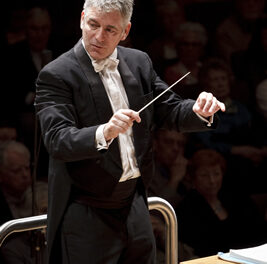Members of the North Carolina Master Chorale – all 250 of them – with soloists and a few accompanying instrumentalists, squeezed into Wake Forest Baptist Church for a concert titled “Modern Masters: Bernstein and Pärt.” A near-capacity audience filled the church on a Saturday afternoon when the State-Carolina football game hung in the balance – well really not so much! Here’s the thing of it: whatever the Master Chorale, under the direction of Alfred E. Sturgis, does, they do well, and this concert, regardless of sports, space, weather, or any other distraction was up to the mark of excellence choral music lovers have come to expect of them.
Opening the program was Leonard Bernstein’s Chichester Psalms, composed in 1964-5 on a commission from the Dean of Chichester Cathedral in Sussex, UK. The original version that we heard, scored for boy treble, four-part chorus, organ, harp, and percussion, was sung in Hebrew. The text is made up of Psalms 108, 23 and 131, plus a few supportive lines from Psalm 100 and 133. All this is put together to make a sort of cantata-like structure that deals with praise in part 1, comfort and threat in part 2, and humility and unity in part 3. West Side Story was written earlier, and Mass, which was to come six years later, was already germinating in Bernstein’s mind. Elements of both can be heard in the Psalms: a hint of jazz influence, rhythmic inventiveness, the Bernstein gift of melody, and his feel for ideal accompaniment – such as in the Psalm 23 solo by the boy treble with its beautiful harp accompaniment.
William Taylor was the boy soprano, and his pure voice in a slightly timid presentation provided what I think Bernstein would have thought of as ideal for the innocence of the boy-shepherd. The harpist was Jacquelyn Bartlett, providing other-worldly support to the music. The percussionist was Chris Nappi, providing drama and excitement to the performance. Brief solos were sung from the choir by Claire Fitzgerald, Evelyn McCauley, James Farlow, and Jonathan de Araujo, illustrating the high quality of voices that make up the NCMC. The organist was Josh Dumbleton, Associate Minister Music/Organist at Edenton Street United Methodist Church in Raleigh.
The second modern master we heard was the highly regarded Estonian composer Arvo Pärt. His music, falling under the general rubric of minimalism, is influenced by plainsong and the early renaissance but is especially known for its structure based on the tones and overtones of bells, a unique sound Pärt labels “tintinnabuli.” Many of his works have an ethereal and hypnotic effect about them.
The Berliner Mass was composed in 1990-91 for four solo voices and organ, later arranged for SATB chorus and strings. We heard it for choir and organ. Solos for the two Alleluias after the Gloria section were sung by tenor Brian Westbrook and bass Phil Hanna. The setting is of the five sections of the Ordinary of the Mass: Kyrie, Gloria, Credo, Sanctus, Agnus Dei, with the extra Alleluias and Veni Sancte Spiritus, appropriate for a Pentecost service.
The Kyrie is quiet and mystical with emphasis on the close harmonies and tonal relationships. The Gloria and the Credo are sung mostly homophonically, i.e., one note for each syllable in more or less declamatory style. The two Alleluias are brief with the choir providing bookends to the chant-like solos. Veni Sancte Spiritus provides a mystical setting for the coming of the Holy Spirit. The Sanctus is a quiet, reflective hymn of praise in this setting and the Agnus Dei is a quiet but fervent prayer to the Lamb of God, ending calmly with the words “dona nobis pacem” (grant us peace).
The harmonic structure and the phrasing of music like this pose unique challenges for the singers and the conductor. However these challenges were hardly noticed because of the superb dedication, talent, and thorough preparation the NCMC brings to each of its performances.
After a very brief pause, during which a free-will offering was taken, the program concluded with three outstanding anthems. Hubert Parry’s stirring “I was glad when they said unto me” was the first. Next came Brahms’ exquisite gem, “Laß dich nur nichts nicht dauren” (Let nothing ever grieve thee). This anthem is a double fugue at the second, in other words, the sopranos start the first phrase on an f; then one measure later, the tenors sing the same phrase beginning on an e-flat; in the next measure, while the sopranos and tenors continue, the altos start the second fugue phrase on an f; and one measure later, the basses sing the same phrase starting on an e-flat. All four parts continue in this manner in a gorgeous flowing of counterpoint and melody, each part rising to the top in its turn. The overall effect is stunning in its beauty.
The closing anthem was “Antiphon” from Five Mystical Songs by Vaughan Williams. George Herbert’s glorious words “Let all the world in every corner sing” provide a fitting conclusion for any choral concert. The organist, I must say in closing, was a constant and consistent workhorse throughout this concert and is due acknowledgement of the high quality of partnership and support he provided the Master Chorale. Hear, hear, Josh Dumbleton!
This program will be repeated Sunday, November 6, 2011, at 3:00 p.m. at Edenton Street United Methodist Church in Raleigh – with added forces from St. Ambrose Episcopal Church, Raleigh Moravian Church and Hayes Barton United Methodist Church. Sounds fantastic!











